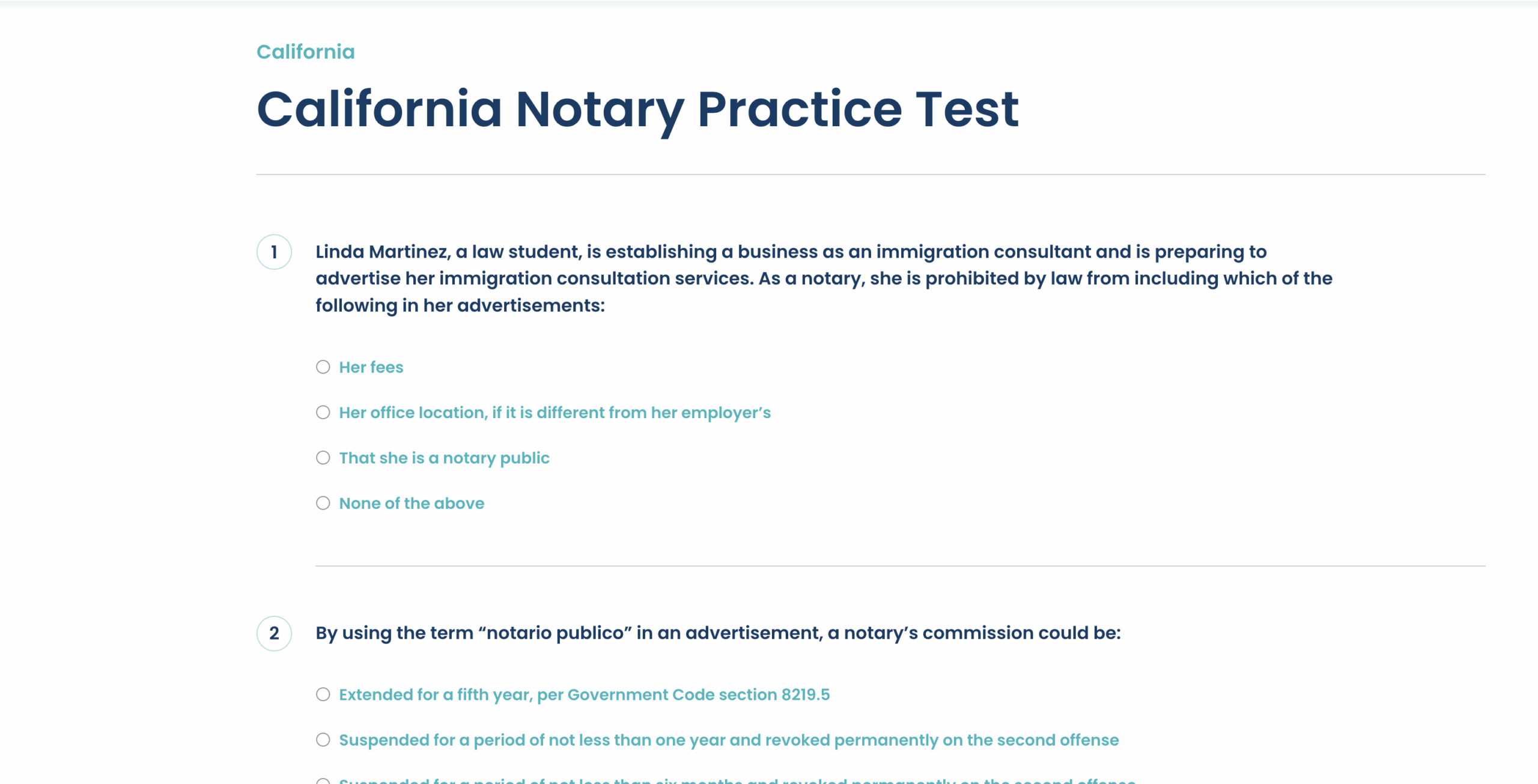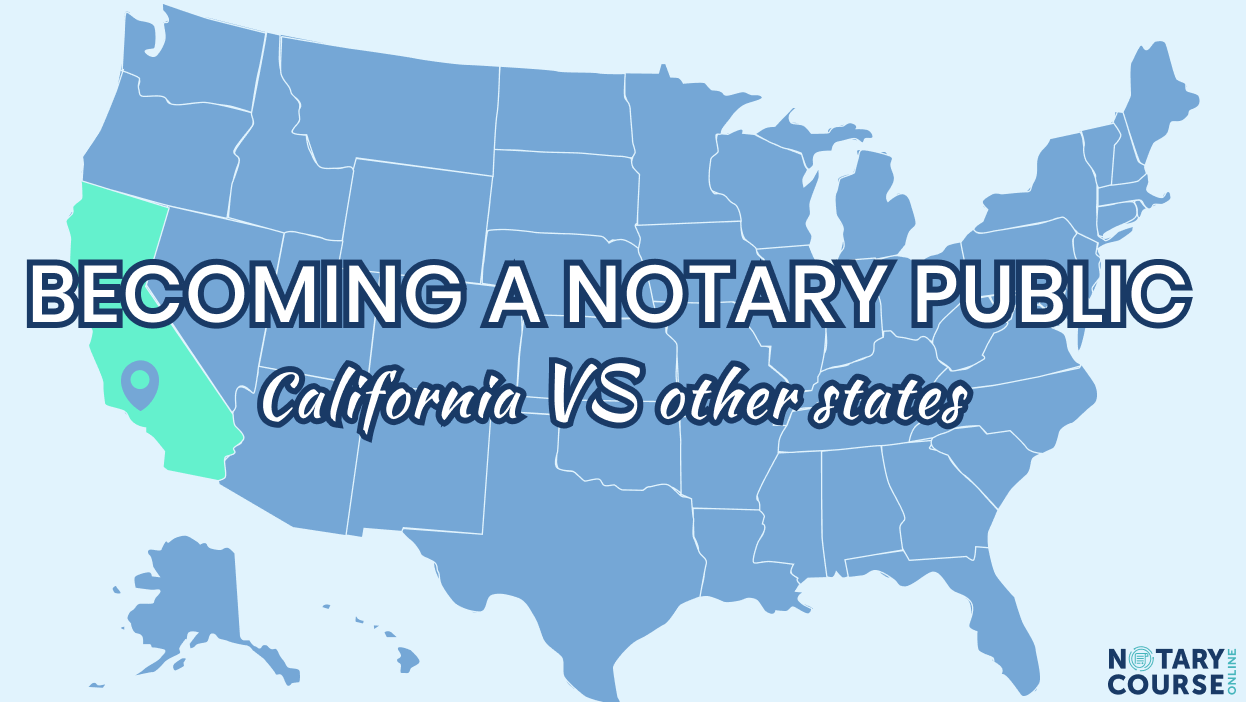California
Blog
How to Use Practice Tests to Boost Confidence Before Your Notary Exam

-
by Notary Course Online
- October 3, 2025
Preparing for the California notary exam can feel overwhelming. Many learners feel anxious about remembering laws, handling time pressure, and performing well on test day. While study guides and courses provide essential knowledge, practice tests offer a different advantage: they build confidence.
Taking a notary exam practice test with Notary Course Online allows you to get familiar with exam-style questions, improve your speed, and reduce test-day nerves. These practice tests give you the confidence to walk into your exam fully prepared and focused.
Practice exams give you the chance to test yourself in a safe environment. They let you see what you know, where you need work, and how the real exam will feel. By practicing often, you can reduce stress, improve recall, and step into the testing room with greater self-assurance.
This guide explains the value of notary practice tests, how they reduce exam anxiety, and practical tips to make the most of them.
Why Practice Tests Are Essential for Notary Exam Prep
A strong study plan is important, but practice tests add something extra: real-world readiness. They help you connect what you’ve learned with how the exam will actually look.
The Role of Practice Tests in Building Exam Confidence
Confidence is one of the biggest challenges for new test-takers. Practice exams create familiarity. When you see the structure, style, and flow of questions ahead of time, you feel prepared instead of surprised. That comfort alone can lift your performance.
How Mock Exams Mirror Real Test Conditions
A well-designed practice test mirrors the real exam format. Multiple-choice questions, legal scenarios, and timed sections give you a preview of what to expect. This makes the actual test day feel like a repeat performance, not a first attempt.
Key Benefits of Taking Notary Practice Tests
Practice tests are more than simple review tools. They train your brain to handle the exact challenges of the exam. With Notary Course Online, you can access practice tests designed to mirror the real exam, helping you reduce anxiety and build confidence. By simulating exam conditions, these study tools ensure you feel prepared and ready to succeed on test day.
Reducing Exam Anxiety Through Familiarity
Anxiety often comes from fear of the unknown. Mock exams replace the unknown with familiarity. When you’ve already taken similar tests, you know what’s coming. This reduces stress and helps you stay calm.
Identifying Weak Areas Before the Real Exam
Everyone has stronger and weaker topics. A practice exam shows you where to focus. If you miss questions about identification requirements or journal procedures, you’ll know to study those sections harder before the real test.
Improving Time Management Skills
The exam has strict time limits. A practice test helps you pace yourself. You learn how long to spend on each question and how to avoid running out of time. This skill is just as important as knowing the material.
How Practice Tests Enhance Learning Retention
Beyond confidence, practice exams also improve how well you remember material.
Active Recall vs. Passive Study
Reading notes is passive. Answering practice questions is active. Active recall forces your brain to pull information from memory, which strengthens long-term retention. That’s why practice tests help knowledge “stick” better than reading alone.
Reinforcing Key Notary Laws and Procedures
California notary laws have many small details. Practice tests highlight them in context. By applying laws to questions, you not only learn but also understand how the state may test you on them.
Using Practice Tests as Study Aids
Each practice test becomes a study tool. Reviewing the correct answers teaches you more than memorization. You see how rules are applied in different scenarios, which deepens understanding.
Practical Tips for Maximizing Practice Test Value
Not all practice is equal. To get the most benefit, you need a smart approach.
Scheduling Regular Mock Exams
Don’t save practice tests for the week before your exam. Schedule them throughout your study plan. For example, take one test at the start, one halfway through, and several in the final weeks. This shows progress over time.
Reviewing Answers and Learning From Mistakes
The value of a practice test isn’t just in taking it — it’s in reviewing it. Study every wrong answer. Ask yourself why the right choice was correct and why you missed it. This step turns mistakes into learning opportunities.
Combining Practice Tests With Study Courses
Practice tests should not replace study materials. They work best as part of a balanced plan. Use courses and guides to learn, then use practice exams to test and reinforce that learning.
Overcoming Exam Anxiety With Practice Tests
Anxiety is one of the biggest obstacles for notary applicants. The good news: practice tests can reduce it.
Turning Stress Into Confidence
When you take multiple practice exams, the real one feels less intimidating. Instead of fearing the unknown, you recognize the familiar. Stress is replaced with confidence.
Simulating Real Exam Pressure in a Safe Setting
Try taking a practice test under the same conditions as the real exam. Sit in a quiet space, use a timer, and avoid distractions. The more you simulate the environment, the less pressure you’ll feel on exam day.
Building Positive Test-Taking Habits
Habits matter. Practice exams train you to read carefully, eliminate wrong answers, and pace yourself. These habits become automatic, reducing mistakes caused by nerves.
Creating a Balanced Notary Exam Prep Plan
Practice exams are powerful, but they should be part of a bigger study strategy.
How Many Practice Tests Are Enough
There’s no single number, but most learners benefit from several. At minimum, plan for two: one early to see your baseline, and one near the end to check readiness. Many choose three to five for steady improvement.
Mixing Study Methods With Test Drills
Balance is key. Mix reading, note-taking, flashcards, and practice tests. Each method strengthens your knowledge in a different way. Together, they create a complete prep plan.
Tracking Progress Over Time
Keep track of your practice test scores. Notice which areas improve and which still need work. This helps you adjust your study focus and build confidence as you see growth.
Conclusion: Confidence Through Consistent Practice
Passing the California notary exam requires knowledge, preparation, and self-confidence. While study materials teach you the law, practice tests prepare you to perform under exam conditions.
By taking practice exams, you reduce anxiety, identify weak areas, and improve memory retention. They help you build time management skills and create a sense of familiarity with the real test.
The key is consistency. Start early, take practice tests regularly, review your mistakes, and track your progress. Combined with steady study, practice exams turn nervous energy into exam-day confidence.
The result? You walk into the testing room not just knowledgeable, but confident and prepared to succeed. Ready to strengthen your notary exam preparation? Contact us today to learn more about practice tests, study resources, and guidance designed to help you succeed with confidence.
FAQs on Notary Practice Test Benefits
Q1: What are the main benefits of notary practice tests?
They reduce exam anxiety, highlight weak areas, and improve time management skills. They also build confidence by simulating real exam conditions.
Q2: How many practice tests should I take before the CA notary exam?
Most learners benefit from three to five practice exams. The first shows your baseline, and the rest measure progress and readiness.
Q3: Can practice tests really reduce exam stress?
Yes. Anxiety comes from the unknown. Practice tests make the exam familiar, which lowers stress and boosts confidence.
Q4: Should I only use practice tests to prepare?
No. Practice tests are best combined with study guides, review sessions, and other study aids. They reinforce learning but should not replace it.
Q5: How do I use practice tests most effectively?
Take them under timed conditions, review all answers, and use mistakes as learning opportunities. Consistent practice is the best approach.






 Congratulations!
Congratulations!